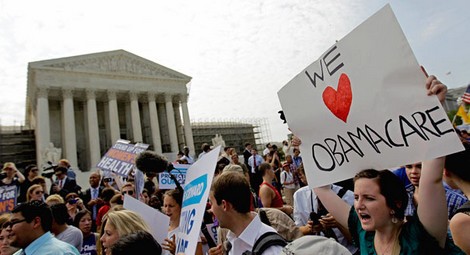Trump Counters Media Narrative With ‘Victims’ of Obamacare
Debra J. Saunders,
President Donald Trump is angry at all the news coverage about the people who stand to be hurt because of the Republican plan to repeal and replace the Affordable Care Act.
“The press is making it look so wonderful,” Trump complained Monday at an event at the White House arranged to counter the usual media narrative — a listening session with “victims” of the ACA, or Obamacare.
Open a newspaper and you can read all about it. The Congressional Budget Office predicted that in just one year, 14 million fewer people likely would be insured if the GOP’s American Health Care Act becomes law. There is little mention of CBO’s past faulty predictions. In 2010, it said there would be 21 million Americans buying policies through Affordable Care Act exchanges by 2016. The actual number was 11.5 million.
There also is scant mention of the Americans who stand to lose coverage as health care providers drop out of the individual market or who pay their premiums but don’t see doctors because their plans’ high deductibles are prohibitive. There is little mention of the 6.5 million Americans who preferred to pay a penalty last year rather than purchase their own policies.
Democrats warn of the GOP bill’s “age tax.” The GOP plan would change a formula that prohibits insurers from charging their oldest consumers, age 50-64, more than three times what they charge adults under age 29. The new ratio, which would be offset by higher tax credits for older Americans, would be 5-to-1. That could mean younger adults will be more likely to buy their own plans, but that’s not the emphasis of many stories.
Later in the week, Trump held a rally in Nashville for a reason. Tennessee’s insurance commissioner has warned that ACA exchanges are “very near collapse,” as providers have bailed out of the state. Two of the 10 Obamacare “victims” invited to the White House hail from Tennessee.
Trump’s “victims” resemble many Americans who resent Obamacare. They work hard and are successful so they often don’t qualify for federal subsidies. They are paying higher premiums for policies with higher deductibles and limited access to once beloved doctors. Many voted for Obama, in part because they believed his promise, that if they liked their doctor, they could keep their doctor.
Wrong. The fact-checking organization PolitiFact rated, “If you like your health care plan, you can keep it” as its 2013 Lie of the Year.
The White House event put a face on people who are miserable because of the Obama health care plan. Kim Sertich of Arizona had her own business for 25 years, and she always bought an individual policy — until this year. Her monthly premium jumped from $365 a month to $809 a month with a $6,800 deductible, and “it just didn’t seem like a good use of my money.”

Colorado cattle rancher Carrie Couey said her family couldn’t afford equipment because her rates are three times higher than they were when Obamacare began.
Gina Sell, a Wisconsin nurse and mother, said that she had to stop working part time and switch to a full-time schedule to pay the $1,200 premium for a high-deductible health care plan. Obamacare has cost her time with her children that she never will get back. She said she sent a daughter with a fever to school for three days because she had to go to her full-time job to pay for health care.
Dr. Manny Sethi operates a nonprofit, Healthy Tennessee, that conducts preventive health fairs across the state. He has seen adults who don’t buy health care, as well as people who have coverage, including Medicaid, but don’t see doctors. The system is too big and too bureaucratic, he believes.
Sethi compared the drafting of the Affordable Care Act to a surgery that starts with one error; the first error becomes magnified as the operation continues and doctors try to compensate for that first mistake. What do his peers think about his meeting with Trump? In Tennessee, Sethi said, “most physicians agree that the exchanges are imploding.”
Cincinnati manufacturer Greg Knox’s issue wasn’t with the exchanges, but with how the ACA’s mandates drove up the cost of the group insurance he provided. He used to provide health care not only for employees, but also their families. It was a point of pride. But he had to pull back as premiums continued to climb.
Knox believes that more competition will drive down costs. Not that he is expecting a huge change. He thinks the plan Trump is pushing is “still too ‘Obamacare Lite.'” But to Knox, “Obamacare Lite” would be an improvement over the Affordable Care Act, which for his business is simply unaffordable.





